Analyzing Parental Involvement Effects on Child Educational Success
VerifiedAdded on 2023/01/19
|10
|3127
|94
Report
AI Summary
This research proposal examines the critical role of parental involvement in children's education, highlighting its positive effects on motivation, self-reliance, and academic performance. The study aims to determine the differences between parental and non-parental involvement in learners' achievements, emphasizing the ethical considerations, social implications, and the importance of a strong parent-school relationship. The literature review supports the hypothesis that parental guidance significantly impacts children's academic success, with case studies illustrating that family participation boosts productivity and positive outlooks in students. The research will employ qualitative methods, including interviews with parents, stakeholders, and educators, to gather in-depth data and analyze thematic patterns. The study will also analyze the impact of parental involvement on student behavior, mental health, and overall educational success, and it will conclude with recommendations for fostering greater parental engagement to improve student outcomes.
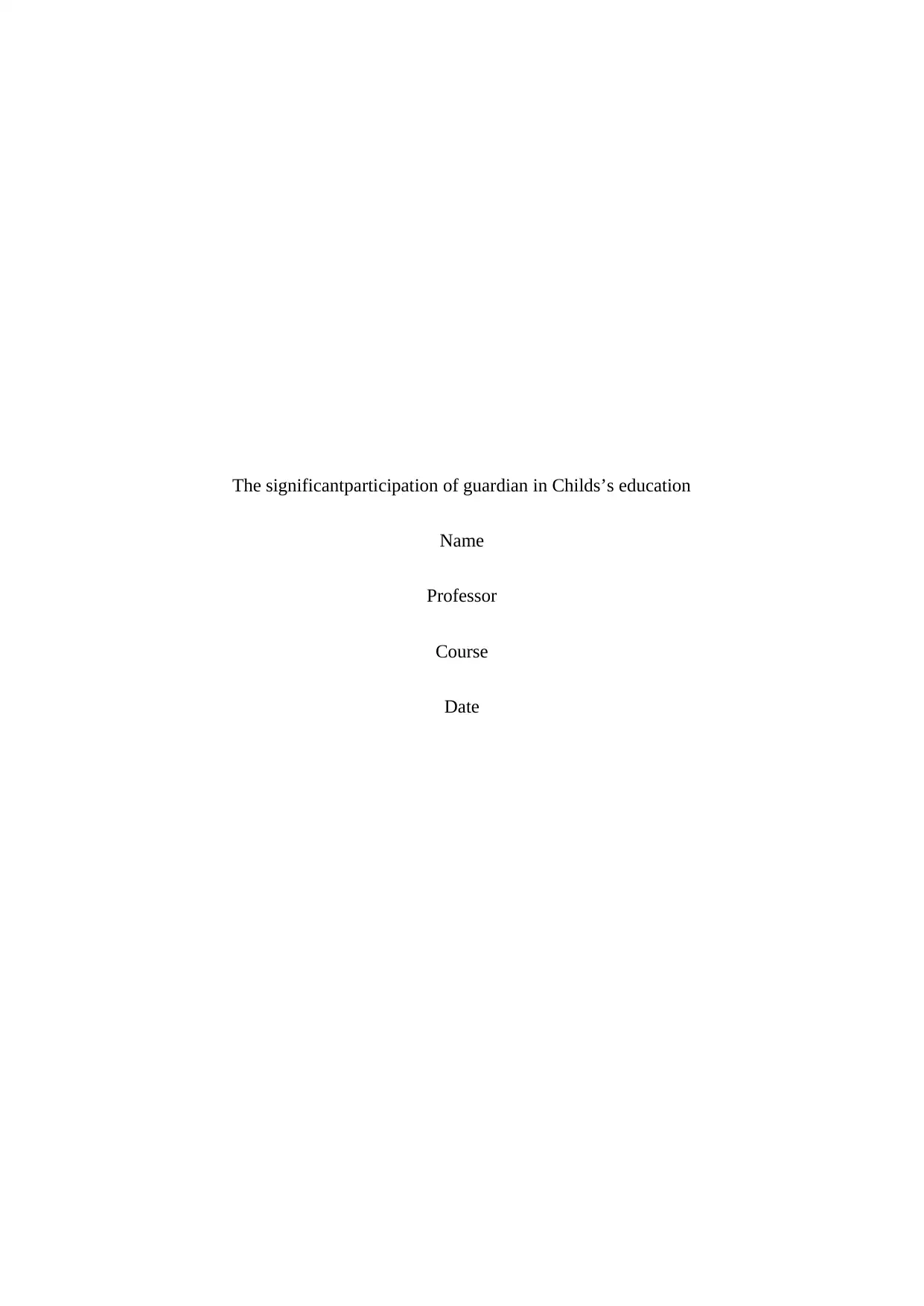
The significantparticipation of guardian in Childs’s education
Name
Professor
Course
Date
Name
Professor
Course
Date
Paraphrase This Document
Need a fresh take? Get an instant paraphrase of this document with our AI Paraphraser
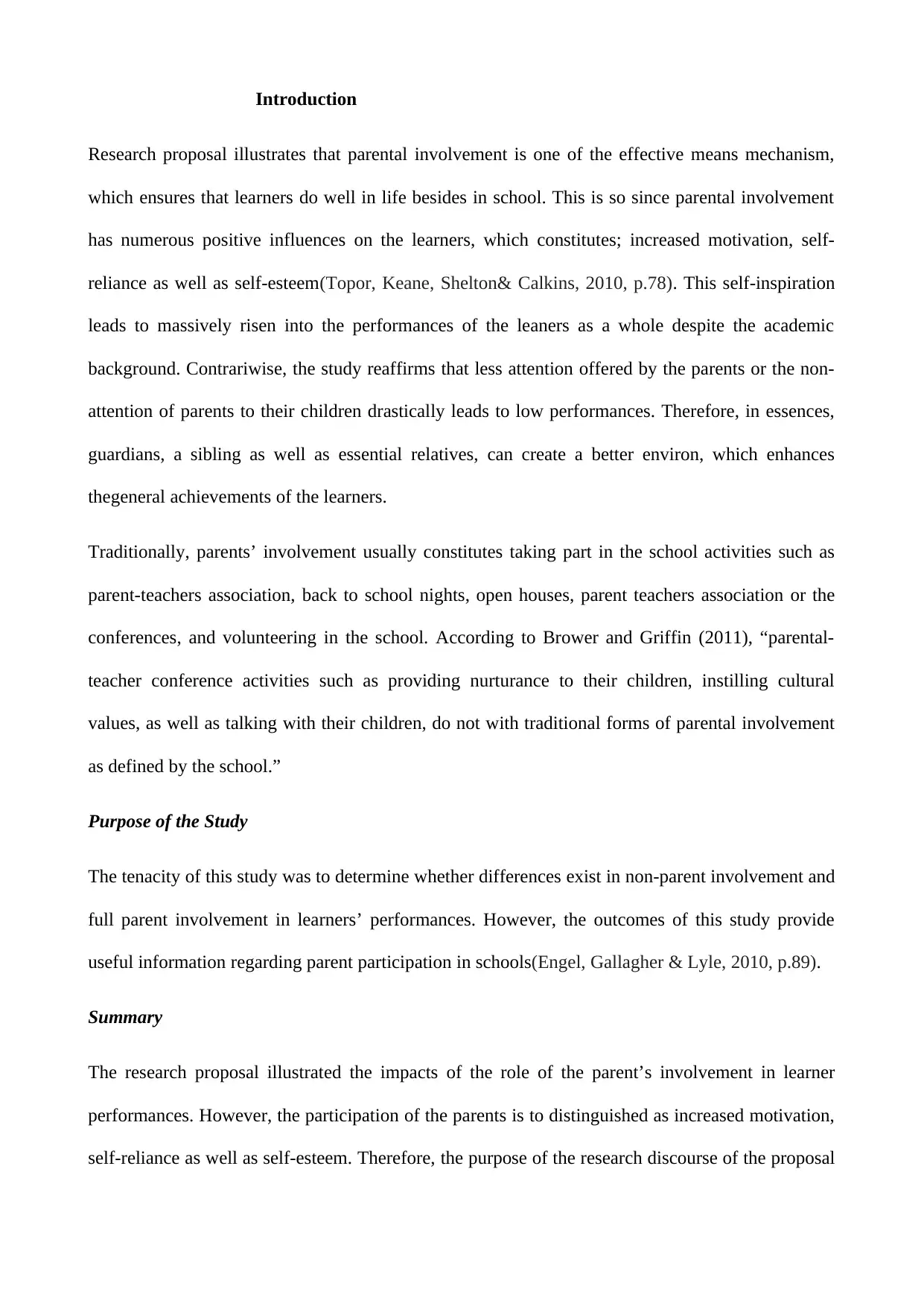
Introduction
Research proposal illustrates that parental involvement is one of the effective means mechanism,
which ensures that learners do well in life besides in school. This is so since parental involvement
has numerous positive influences on the learners, which constitutes; increased motivation, self-
reliance as well as self-esteem(Topor, Keane, Shelton& Calkins, 2010, p.78). This self-inspiration
leads to massively risen into the performances of the leaners as a whole despite the academic
background. Contrariwise, the study reaffirms that less attention offered by the parents or the non-
attention of parents to their children drastically leads to low performances. Therefore, in essences,
guardians, a sibling as well as essential relatives, can create a better environ, which enhances
thegeneral achievements of the learners.
Traditionally, parents’ involvement usually constitutes taking part in the school activities such as
parent-teachers association, back to school nights, open houses, parent teachers association or the
conferences, and volunteering in the school. According to Brower and Griffin (2011), “parental-
teacher conference activities such as providing nurturance to their children, instilling cultural
values, as well as talking with their children, do not with traditional forms of parental involvement
as defined by the school.”
Purpose of the Study
The tenacity of this study was to determine whether differences exist in non-parent involvement and
full parent involvement in learners’ performances. However, the outcomes of this study provide
useful information regarding parent participation in schools(Engel, Gallagher & Lyle, 2010, p.89).
Summary
The research proposal illustrated the impacts of the role of the parent’s involvement in learner
performances. However, the participation of the parents is to distinguished as increased motivation,
self-reliance as well as self-esteem. Therefore, the purpose of the research discourse of the proposal
Research proposal illustrates that parental involvement is one of the effective means mechanism,
which ensures that learners do well in life besides in school. This is so since parental involvement
has numerous positive influences on the learners, which constitutes; increased motivation, self-
reliance as well as self-esteem(Topor, Keane, Shelton& Calkins, 2010, p.78). This self-inspiration
leads to massively risen into the performances of the leaners as a whole despite the academic
background. Contrariwise, the study reaffirms that less attention offered by the parents or the non-
attention of parents to their children drastically leads to low performances. Therefore, in essences,
guardians, a sibling as well as essential relatives, can create a better environ, which enhances
thegeneral achievements of the learners.
Traditionally, parents’ involvement usually constitutes taking part in the school activities such as
parent-teachers association, back to school nights, open houses, parent teachers association or the
conferences, and volunteering in the school. According to Brower and Griffin (2011), “parental-
teacher conference activities such as providing nurturance to their children, instilling cultural
values, as well as talking with their children, do not with traditional forms of parental involvement
as defined by the school.”
Purpose of the Study
The tenacity of this study was to determine whether differences exist in non-parent involvement and
full parent involvement in learners’ performances. However, the outcomes of this study provide
useful information regarding parent participation in schools(Engel, Gallagher & Lyle, 2010, p.89).
Summary
The research proposal illustrated the impacts of the role of the parent’s involvement in learner
performances. However, the participation of the parents is to distinguished as increased motivation,
self-reliance as well as self-esteem. Therefore, the purpose of the research discourse of the proposal
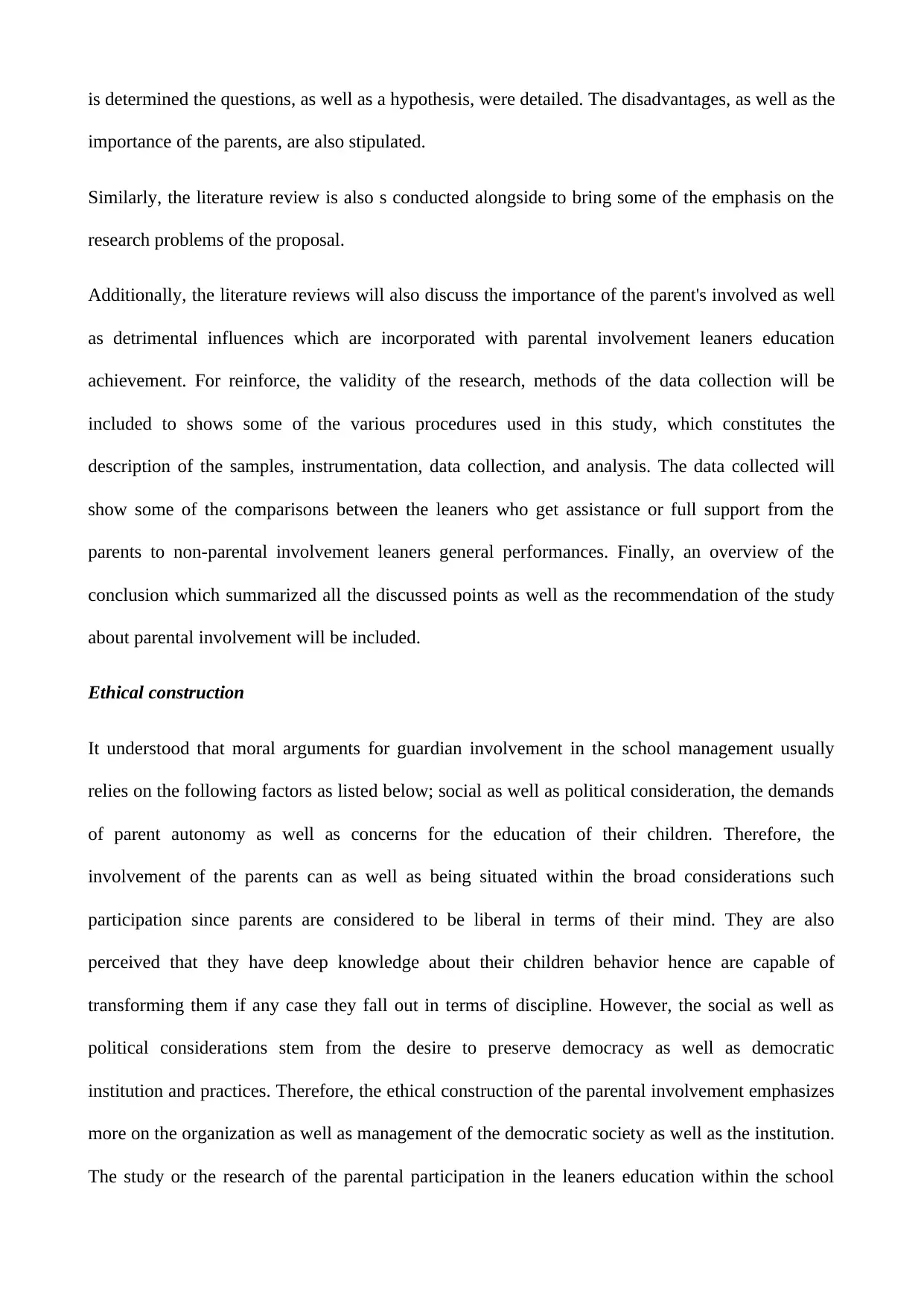
is determined the questions, as well as a hypothesis, were detailed. The disadvantages, as well as the
importance of the parents, are also stipulated.
Similarly, the literature review is also s conducted alongside to bring some of the emphasis on the
research problems of the proposal.
Additionally, the literature reviews will also discuss the importance of the parent's involved as well
as detrimental influences which are incorporated with parental involvement leaners education
achievement. For reinforce, the validity of the research, methods of the data collection will be
included to shows some of the various procedures used in this study, which constitutes the
description of the samples, instrumentation, data collection, and analysis. The data collected will
show some of the comparisons between the leaners who get assistance or full support from the
parents to non-parental involvement leaners general performances. Finally, an overview of the
conclusion which summarized all the discussed points as well as the recommendation of the study
about parental involvement will be included.
Ethical construction
It understood that moral arguments for guardian involvement in the school management usually
relies on the following factors as listed below; social as well as political consideration, the demands
of parent autonomy as well as concerns for the education of their children. Therefore, the
involvement of the parents can as well as being situated within the broad considerations such
participation since parents are considered to be liberal in terms of their mind. They are also
perceived that they have deep knowledge about their children behavior hence are capable of
transforming them if any case they fall out in terms of discipline. However, the social as well as
political considerations stem from the desire to preserve democracy as well as democratic
institution and practices. Therefore, the ethical construction of the parental involvement emphasizes
more on the organization as well as management of the democratic society as well as the institution.
The study or the research of the parental participation in the leaners education within the school
importance of the parents, are also stipulated.
Similarly, the literature review is also s conducted alongside to bring some of the emphasis on the
research problems of the proposal.
Additionally, the literature reviews will also discuss the importance of the parent's involved as well
as detrimental influences which are incorporated with parental involvement leaners education
achievement. For reinforce, the validity of the research, methods of the data collection will be
included to shows some of the various procedures used in this study, which constitutes the
description of the samples, instrumentation, data collection, and analysis. The data collected will
show some of the comparisons between the leaners who get assistance or full support from the
parents to non-parental involvement leaners general performances. Finally, an overview of the
conclusion which summarized all the discussed points as well as the recommendation of the study
about parental involvement will be included.
Ethical construction
It understood that moral arguments for guardian involvement in the school management usually
relies on the following factors as listed below; social as well as political consideration, the demands
of parent autonomy as well as concerns for the education of their children. Therefore, the
involvement of the parents can as well as being situated within the broad considerations such
participation since parents are considered to be liberal in terms of their mind. They are also
perceived that they have deep knowledge about their children behavior hence are capable of
transforming them if any case they fall out in terms of discipline. However, the social as well as
political considerations stem from the desire to preserve democracy as well as democratic
institution and practices. Therefore, the ethical construction of the parental involvement emphasizes
more on the organization as well as management of the democratic society as well as the institution.
The study or the research of the parental participation in the leaners education within the school
⊘ This is a preview!⊘
Do you want full access?
Subscribe today to unlock all pages.

Trusted by 1+ million students worldwide
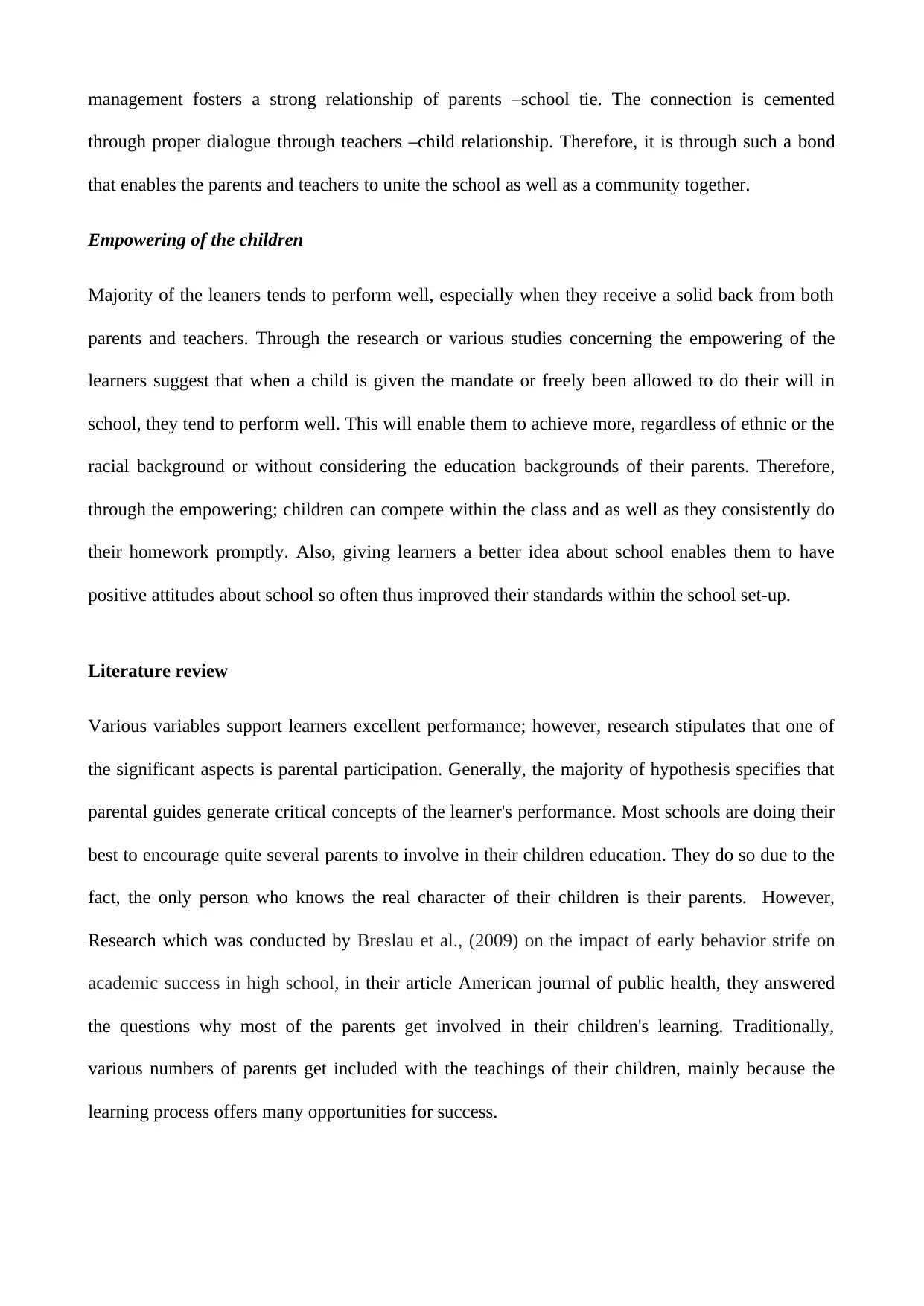
management fosters a strong relationship of parents –school tie. The connection is cemented
through proper dialogue through teachers –child relationship. Therefore, it is through such a bond
that enables the parents and teachers to unite the school as well as a community together.
Empowering of the children
Majority of the leaners tends to perform well, especially when they receive a solid back from both
parents and teachers. Through the research or various studies concerning the empowering of the
learners suggest that when a child is given the mandate or freely been allowed to do their will in
school, they tend to perform well. This will enable them to achieve more, regardless of ethnic or the
racial background or without considering the education backgrounds of their parents. Therefore,
through the empowering; children can compete within the class and as well as they consistently do
their homework promptly. Also, giving learners a better idea about school enables them to have
positive attitudes about school so often thus improved their standards within the school set-up.
Literature review
Various variables support learners excellent performance; however, research stipulates that one of
the significant aspects is parental participation. Generally, the majority of hypothesis specifies that
parental guides generate critical concepts of the learner's performance. Most schools are doing their
best to encourage quite several parents to involve in their children education. They do so due to the
fact, the only person who knows the real character of their children is their parents. However,
Research which was conducted by Breslau et al., (2009) on the impact of early behavior strife on
academic success in high school, in their article American journal of public health, they answered
the questions why most of the parents get involved in their children's learning. Traditionally,
various numbers of parents get included with the teachings of their children, mainly because the
learning process offers many opportunities for success.
through proper dialogue through teachers –child relationship. Therefore, it is through such a bond
that enables the parents and teachers to unite the school as well as a community together.
Empowering of the children
Majority of the leaners tends to perform well, especially when they receive a solid back from both
parents and teachers. Through the research or various studies concerning the empowering of the
learners suggest that when a child is given the mandate or freely been allowed to do their will in
school, they tend to perform well. This will enable them to achieve more, regardless of ethnic or the
racial background or without considering the education backgrounds of their parents. Therefore,
through the empowering; children can compete within the class and as well as they consistently do
their homework promptly. Also, giving learners a better idea about school enables them to have
positive attitudes about school so often thus improved their standards within the school set-up.
Literature review
Various variables support learners excellent performance; however, research stipulates that one of
the significant aspects is parental participation. Generally, the majority of hypothesis specifies that
parental guides generate critical concepts of the learner's performance. Most schools are doing their
best to encourage quite several parents to involve in their children education. They do so due to the
fact, the only person who knows the real character of their children is their parents. However,
Research which was conducted by Breslau et al., (2009) on the impact of early behavior strife on
academic success in high school, in their article American journal of public health, they answered
the questions why most of the parents get involved in their children's learning. Traditionally,
various numbers of parents get included with the teachings of their children, mainly because the
learning process offers many opportunities for success.
Paraphrase This Document
Need a fresh take? Get an instant paraphrase of this document with our AI Paraphraser
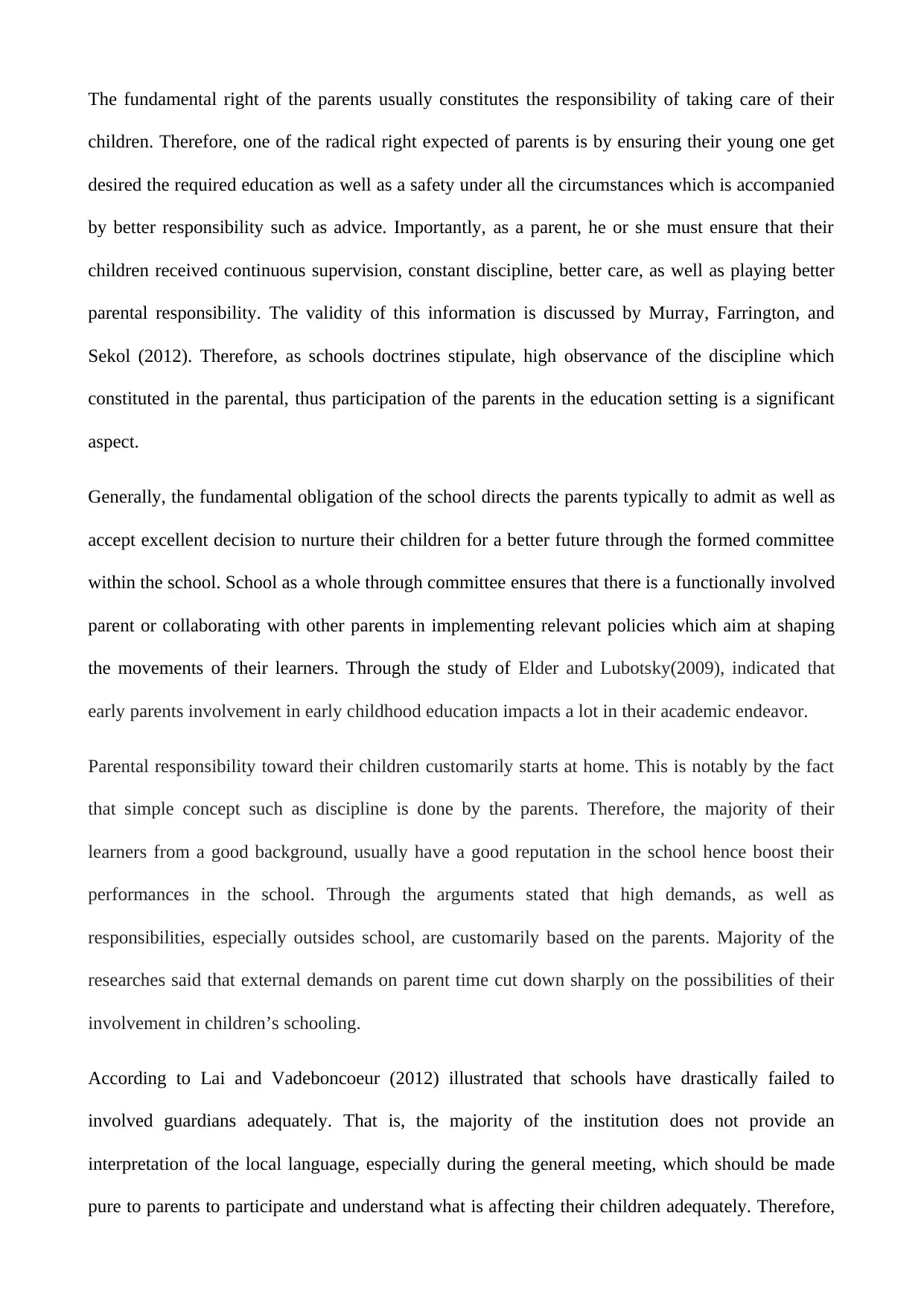
The fundamental right of the parents usually constitutes the responsibility of taking care of their
children. Therefore, one of the radical right expected of parents is by ensuring their young one get
desired the required education as well as a safety under all the circumstances which is accompanied
by better responsibility such as advice. Importantly, as a parent, he or she must ensure that their
children received continuous supervision, constant discipline, better care, as well as playing better
parental responsibility. The validity of this information is discussed by Murray, Farrington, and
Sekol (2012). Therefore, as schools doctrines stipulate, high observance of the discipline which
constituted in the parental, thus participation of the parents in the education setting is a significant
aspect.
Generally, the fundamental obligation of the school directs the parents typically to admit as well as
accept excellent decision to nurture their children for a better future through the formed committee
within the school. School as a whole through committee ensures that there is a functionally involved
parent or collaborating with other parents in implementing relevant policies which aim at shaping
the movements of their learners. Through the study of Elder and Lubotsky(2009), indicated that
early parents involvement in early childhood education impacts a lot in their academic endeavor.
Parental responsibility toward their children customarily starts at home. This is notably by the fact
that simple concept such as discipline is done by the parents. Therefore, the majority of their
learners from a good background, usually have a good reputation in the school hence boost their
performances in the school. Through the arguments stated that high demands, as well as
responsibilities, especially outsides school, are customarily based on the parents. Majority of the
researches said that external demands on parent time cut down sharply on the possibilities of their
involvement in children’s schooling.
According to Lai and Vadeboncoeur (2012) illustrated that schools have drastically failed to
involved guardians adequately. That is, the majority of the institution does not provide an
interpretation of the local language, especially during the general meeting, which should be made
pure to parents to participate and understand what is affecting their children adequately. Therefore,
children. Therefore, one of the radical right expected of parents is by ensuring their young one get
desired the required education as well as a safety under all the circumstances which is accompanied
by better responsibility such as advice. Importantly, as a parent, he or she must ensure that their
children received continuous supervision, constant discipline, better care, as well as playing better
parental responsibility. The validity of this information is discussed by Murray, Farrington, and
Sekol (2012). Therefore, as schools doctrines stipulate, high observance of the discipline which
constituted in the parental, thus participation of the parents in the education setting is a significant
aspect.
Generally, the fundamental obligation of the school directs the parents typically to admit as well as
accept excellent decision to nurture their children for a better future through the formed committee
within the school. School as a whole through committee ensures that there is a functionally involved
parent or collaborating with other parents in implementing relevant policies which aim at shaping
the movements of their learners. Through the study of Elder and Lubotsky(2009), indicated that
early parents involvement in early childhood education impacts a lot in their academic endeavor.
Parental responsibility toward their children customarily starts at home. This is notably by the fact
that simple concept such as discipline is done by the parents. Therefore, the majority of their
learners from a good background, usually have a good reputation in the school hence boost their
performances in the school. Through the arguments stated that high demands, as well as
responsibilities, especially outsides school, are customarily based on the parents. Majority of the
researches said that external demands on parent time cut down sharply on the possibilities of their
involvement in children’s schooling.
According to Lai and Vadeboncoeur (2012) illustrated that schools have drastically failed to
involved guardians adequately. That is, the majority of the institution does not provide an
interpretation of the local language, especially during the general meeting, which should be made
pure to parents to participate and understand what is affecting their children adequately. Therefore,
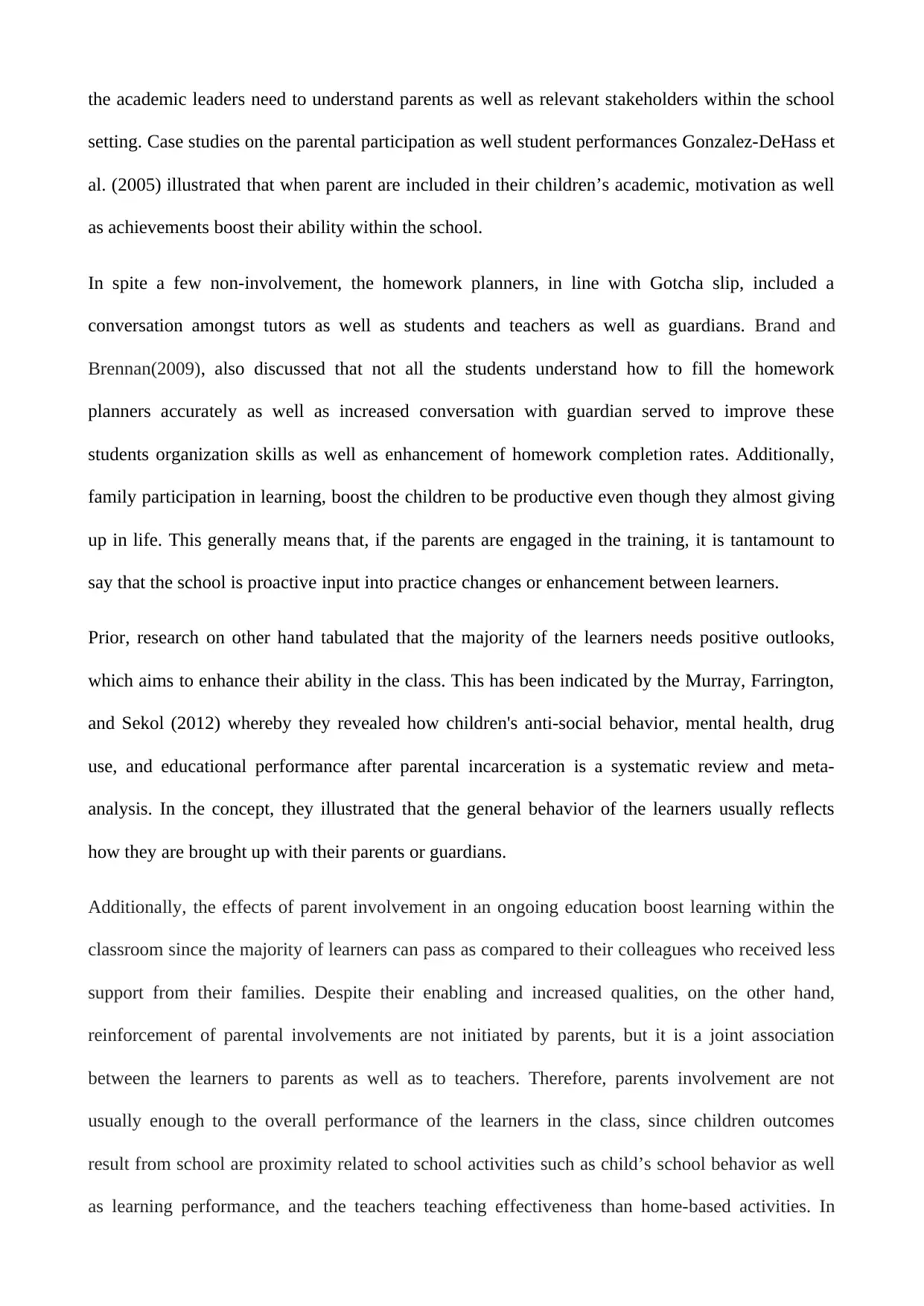
the academic leaders need to understand parents as well as relevant stakeholders within the school
setting. Case studies on the parental participation as well student performances Gonzalez-DeHass et
al. (2005) illustrated that when parent are included in their children’s academic, motivation as well
as achievements boost their ability within the school.
In spite a few non-involvement, the homework planners, in line with Gotcha slip, included a
conversation amongst tutors as well as students and teachers as well as guardians. Brand and
Brennan(2009), also discussed that not all the students understand how to fill the homework
planners accurately as well as increased conversation with guardian served to improve these
students organization skills as well as enhancement of homework completion rates. Additionally,
family participation in learning, boost the children to be productive even though they almost giving
up in life. This generally means that, if the parents are engaged in the training, it is tantamount to
say that the school is proactive input into practice changes or enhancement between learners.
Prior, research on other hand tabulated that the majority of the learners needs positive outlooks,
which aims to enhance their ability in the class. This has been indicated by the Murray, Farrington,
and Sekol (2012) whereby they revealed how children's anti-social behavior, mental health, drug
use, and educational performance after parental incarceration is a systematic review and meta-
analysis. In the concept, they illustrated that the general behavior of the learners usually reflects
how they are brought up with their parents or guardians.
Additionally, the effects of parent involvement in an ongoing education boost learning within the
classroom since the majority of learners can pass as compared to their colleagues who received less
support from their families. Despite their enabling and increased qualities, on the other hand,
reinforcement of parental involvements are not initiated by parents, but it is a joint association
between the learners to parents as well as to teachers. Therefore, parents involvement are not
usually enough to the overall performance of the learners in the class, since children outcomes
result from school are proximity related to school activities such as child’s school behavior as well
as learning performance, and the teachers teaching effectiveness than home-based activities. In
setting. Case studies on the parental participation as well student performances Gonzalez-DeHass et
al. (2005) illustrated that when parent are included in their children’s academic, motivation as well
as achievements boost their ability within the school.
In spite a few non-involvement, the homework planners, in line with Gotcha slip, included a
conversation amongst tutors as well as students and teachers as well as guardians. Brand and
Brennan(2009), also discussed that not all the students understand how to fill the homework
planners accurately as well as increased conversation with guardian served to improve these
students organization skills as well as enhancement of homework completion rates. Additionally,
family participation in learning, boost the children to be productive even though they almost giving
up in life. This generally means that, if the parents are engaged in the training, it is tantamount to
say that the school is proactive input into practice changes or enhancement between learners.
Prior, research on other hand tabulated that the majority of the learners needs positive outlooks,
which aims to enhance their ability in the class. This has been indicated by the Murray, Farrington,
and Sekol (2012) whereby they revealed how children's anti-social behavior, mental health, drug
use, and educational performance after parental incarceration is a systematic review and meta-
analysis. In the concept, they illustrated that the general behavior of the learners usually reflects
how they are brought up with their parents or guardians.
Additionally, the effects of parent involvement in an ongoing education boost learning within the
classroom since the majority of learners can pass as compared to their colleagues who received less
support from their families. Despite their enabling and increased qualities, on the other hand,
reinforcement of parental involvements are not initiated by parents, but it is a joint association
between the learners to parents as well as to teachers. Therefore, parents involvement are not
usually enough to the overall performance of the learners in the class, since children outcomes
result from school are proximity related to school activities such as child’s school behavior as well
as learning performance, and the teachers teaching effectiveness than home-based activities. In
⊘ This is a preview!⊘
Do you want full access?
Subscribe today to unlock all pages.

Trusted by 1+ million students worldwide
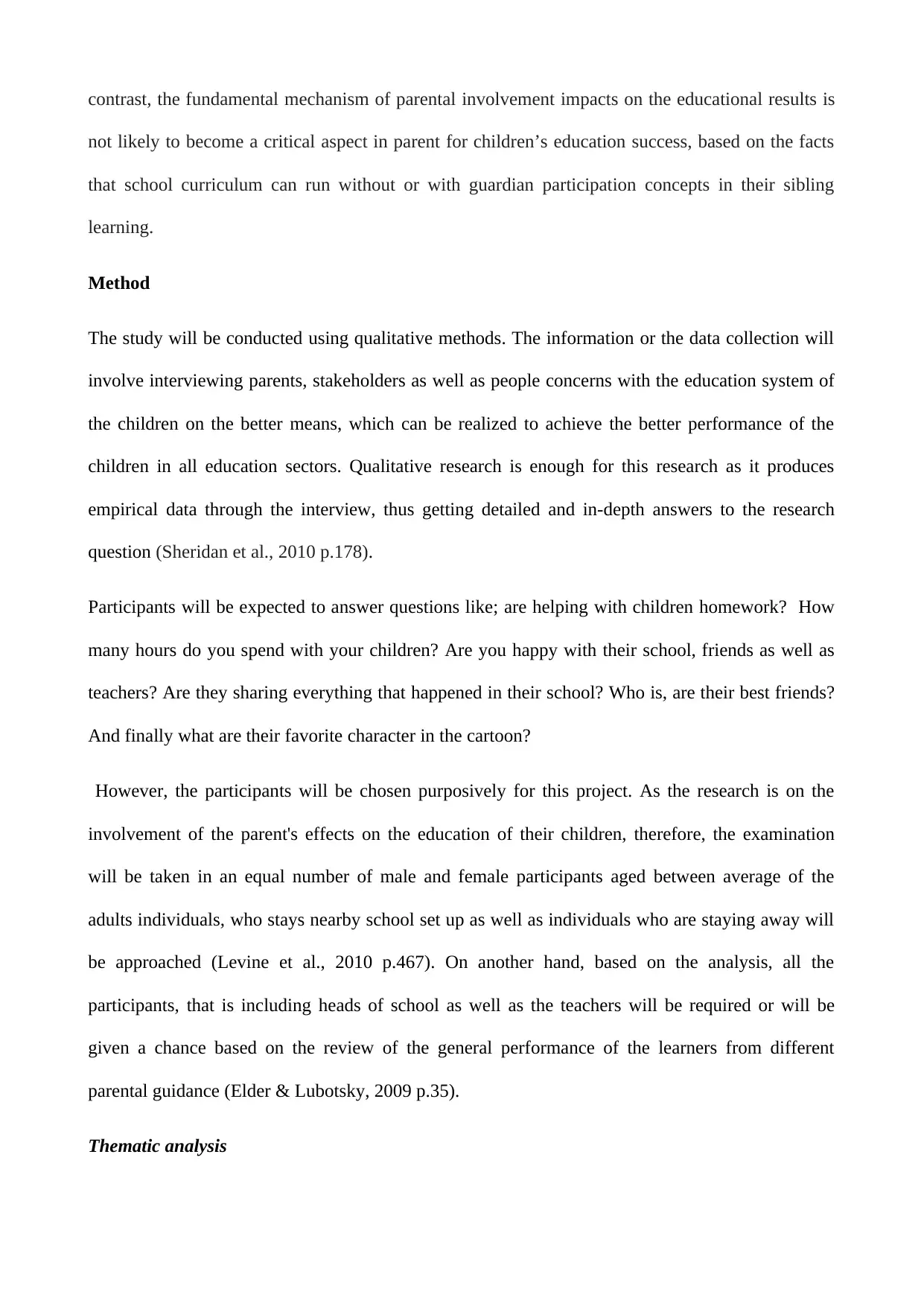
contrast, the fundamental mechanism of parental involvement impacts on the educational results is
not likely to become a critical aspect in parent for children’s education success, based on the facts
that school curriculum can run without or with guardian participation concepts in their sibling
learning.
Method
The study will be conducted using qualitative methods. The information or the data collection will
involve interviewing parents, stakeholders as well as people concerns with the education system of
the children on the better means, which can be realized to achieve the better performance of the
children in all education sectors. Qualitative research is enough for this research as it produces
empirical data through the interview, thus getting detailed and in-depth answers to the research
question (Sheridan et al., 2010 p.178).
Participants will be expected to answer questions like; are helping with children homework? How
many hours do you spend with your children? Are you happy with their school, friends as well as
teachers? Are they sharing everything that happened in their school? Who is, are their best friends?
And finally what are their favorite character in the cartoon?
However, the participants will be chosen purposively for this project. As the research is on the
involvement of the parent's effects on the education of their children, therefore, the examination
will be taken in an equal number of male and female participants aged between average of the
adults individuals, who stays nearby school set up as well as individuals who are staying away will
be approached (Levine et al., 2010 p.467). On another hand, based on the analysis, all the
participants, that is including heads of school as well as the teachers will be required or will be
given a chance based on the review of the general performance of the learners from different
parental guidance (Elder & Lubotsky, 2009 p.35).
Thematic analysis
not likely to become a critical aspect in parent for children’s education success, based on the facts
that school curriculum can run without or with guardian participation concepts in their sibling
learning.
Method
The study will be conducted using qualitative methods. The information or the data collection will
involve interviewing parents, stakeholders as well as people concerns with the education system of
the children on the better means, which can be realized to achieve the better performance of the
children in all education sectors. Qualitative research is enough for this research as it produces
empirical data through the interview, thus getting detailed and in-depth answers to the research
question (Sheridan et al., 2010 p.178).
Participants will be expected to answer questions like; are helping with children homework? How
many hours do you spend with your children? Are you happy with their school, friends as well as
teachers? Are they sharing everything that happened in their school? Who is, are their best friends?
And finally what are their favorite character in the cartoon?
However, the participants will be chosen purposively for this project. As the research is on the
involvement of the parent's effects on the education of their children, therefore, the examination
will be taken in an equal number of male and female participants aged between average of the
adults individuals, who stays nearby school set up as well as individuals who are staying away will
be approached (Levine et al., 2010 p.467). On another hand, based on the analysis, all the
participants, that is including heads of school as well as the teachers will be required or will be
given a chance based on the review of the general performance of the learners from different
parental guidance (Elder & Lubotsky, 2009 p.35).
Thematic analysis
Paraphrase This Document
Need a fresh take? Get an instant paraphrase of this document with our AI Paraphraser
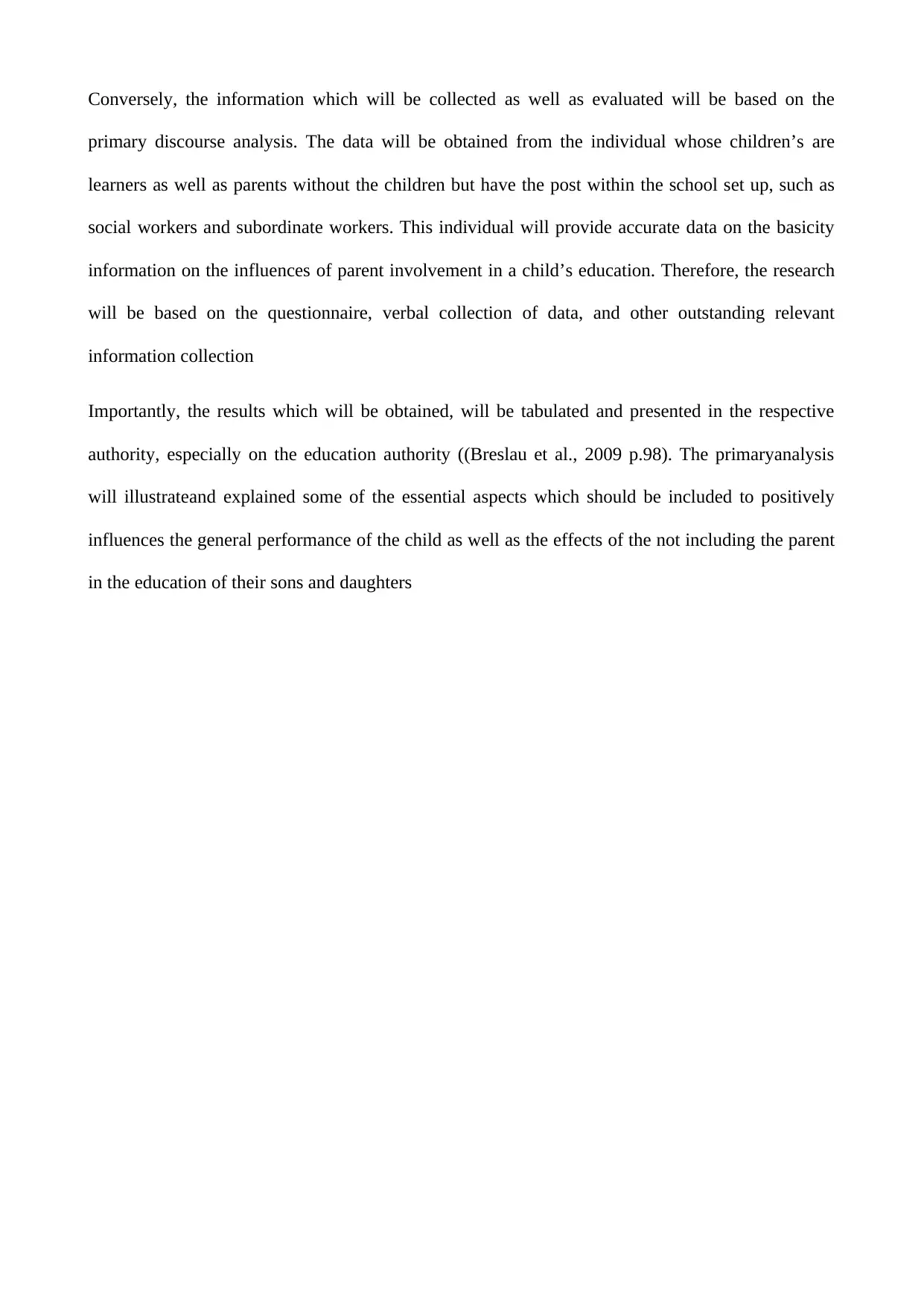
Conversely, the information which will be collected as well as evaluated will be based on the
primary discourse analysis. The data will be obtained from the individual whose children’s are
learners as well as parents without the children but have the post within the school set up, such as
social workers and subordinate workers. This individual will provide accurate data on the basicity
information on the influences of parent involvement in a child’s education. Therefore, the research
will be based on the questionnaire, verbal collection of data, and other outstanding relevant
information collection
Importantly, the results which will be obtained, will be tabulated and presented in the respective
authority, especially on the education authority ((Breslau et al., 2009 p.98). The primaryanalysis
will illustrateand explained some of the essential aspects which should be included to positively
influences the general performance of the child as well as the effects of the not including the parent
in the education of their sons and daughters
primary discourse analysis. The data will be obtained from the individual whose children’s are
learners as well as parents without the children but have the post within the school set up, such as
social workers and subordinate workers. This individual will provide accurate data on the basicity
information on the influences of parent involvement in a child’s education. Therefore, the research
will be based on the questionnaire, verbal collection of data, and other outstanding relevant
information collection
Importantly, the results which will be obtained, will be tabulated and presented in the respective
authority, especially on the education authority ((Breslau et al., 2009 p.98). The primaryanalysis
will illustrateand explained some of the essential aspects which should be included to positively
influences the general performance of the child as well as the effects of the not including the parent
in the education of their sons and daughters
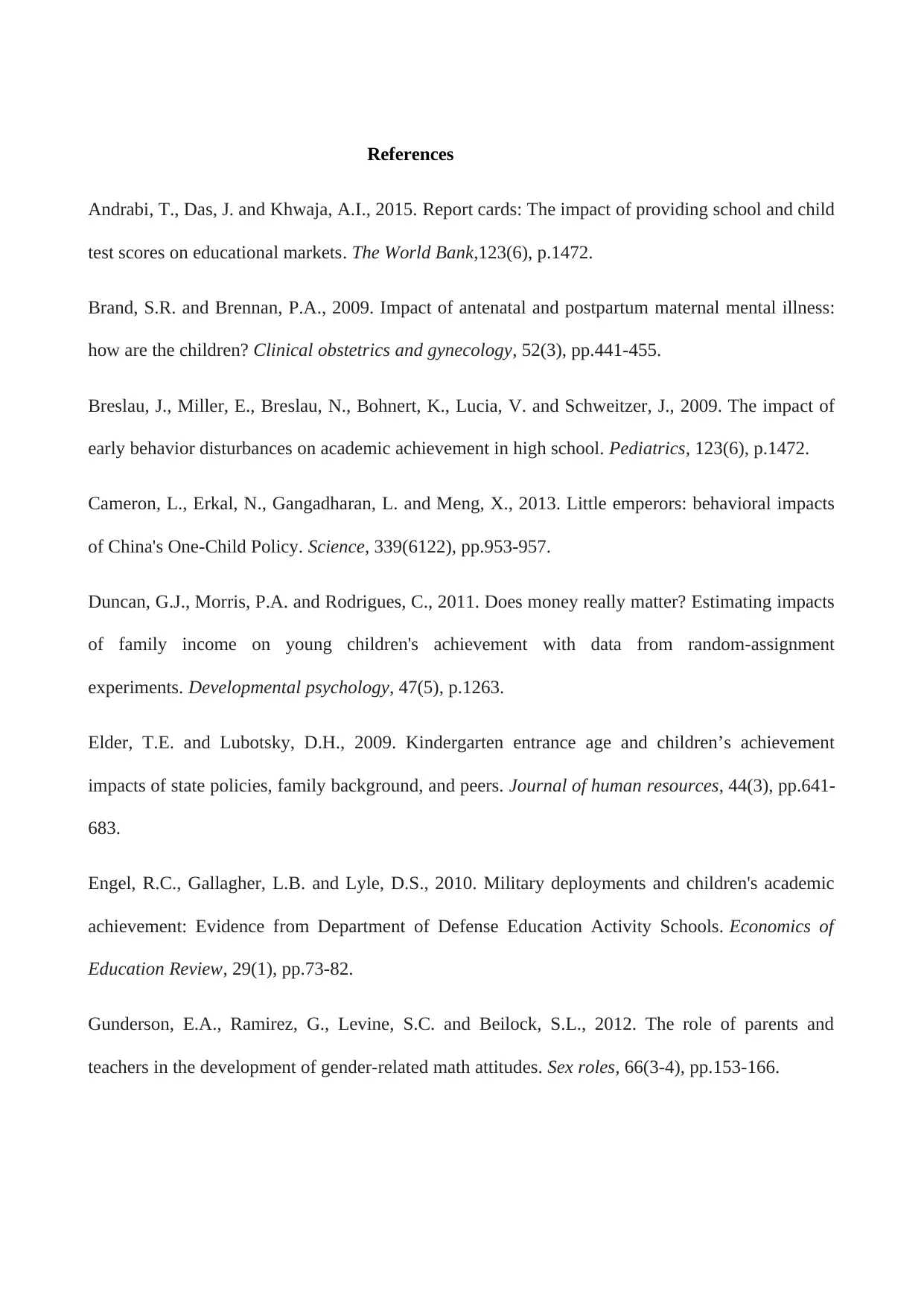
References
Andrabi, T., Das, J. and Khwaja, A.I., 2015. Report cards: The impact of providing school and child
test scores on educational markets. The World Bank,123(6), p.1472.
Brand, S.R. and Brennan, P.A., 2009. Impact of antenatal and postpartum maternal mental illness:
how are the children? Clinical obstetrics and gynecology, 52(3), pp.441-455.
Breslau, J., Miller, E., Breslau, N., Bohnert, K., Lucia, V. and Schweitzer, J., 2009. The impact of
early behavior disturbances on academic achievement in high school. Pediatrics, 123(6), p.1472.
Cameron, L., Erkal, N., Gangadharan, L. and Meng, X., 2013. Little emperors: behavioral impacts
of China's One-Child Policy. Science, 339(6122), pp.953-957.
Duncan, G.J., Morris, P.A. and Rodrigues, C., 2011. Does money really matter? Estimating impacts
of family income on young children's achievement with data from random-assignment
experiments. Developmental psychology, 47(5), p.1263.
Elder, T.E. and Lubotsky, D.H., 2009. Kindergarten entrance age and children’s achievement
impacts of state policies, family background, and peers. Journal of human resources, 44(3), pp.641-
683.
Engel, R.C., Gallagher, L.B. and Lyle, D.S., 2010. Military deployments and children's academic
achievement: Evidence from Department of Defense Education Activity Schools. Economics of
Education Review, 29(1), pp.73-82.
Gunderson, E.A., Ramirez, G., Levine, S.C. and Beilock, S.L., 2012. The role of parents and
teachers in the development of gender-related math attitudes. Sex roles, 66(3-4), pp.153-166.
Andrabi, T., Das, J. and Khwaja, A.I., 2015. Report cards: The impact of providing school and child
test scores on educational markets. The World Bank,123(6), p.1472.
Brand, S.R. and Brennan, P.A., 2009. Impact of antenatal and postpartum maternal mental illness:
how are the children? Clinical obstetrics and gynecology, 52(3), pp.441-455.
Breslau, J., Miller, E., Breslau, N., Bohnert, K., Lucia, V. and Schweitzer, J., 2009. The impact of
early behavior disturbances on academic achievement in high school. Pediatrics, 123(6), p.1472.
Cameron, L., Erkal, N., Gangadharan, L. and Meng, X., 2013. Little emperors: behavioral impacts
of China's One-Child Policy. Science, 339(6122), pp.953-957.
Duncan, G.J., Morris, P.A. and Rodrigues, C., 2011. Does money really matter? Estimating impacts
of family income on young children's achievement with data from random-assignment
experiments. Developmental psychology, 47(5), p.1263.
Elder, T.E. and Lubotsky, D.H., 2009. Kindergarten entrance age and children’s achievement
impacts of state policies, family background, and peers. Journal of human resources, 44(3), pp.641-
683.
Engel, R.C., Gallagher, L.B. and Lyle, D.S., 2010. Military deployments and children's academic
achievement: Evidence from Department of Defense Education Activity Schools. Economics of
Education Review, 29(1), pp.73-82.
Gunderson, E.A., Ramirez, G., Levine, S.C. and Beilock, S.L., 2012. The role of parents and
teachers in the development of gender-related math attitudes. Sex roles, 66(3-4), pp.153-166.
⊘ This is a preview!⊘
Do you want full access?
Subscribe today to unlock all pages.

Trusted by 1+ million students worldwide
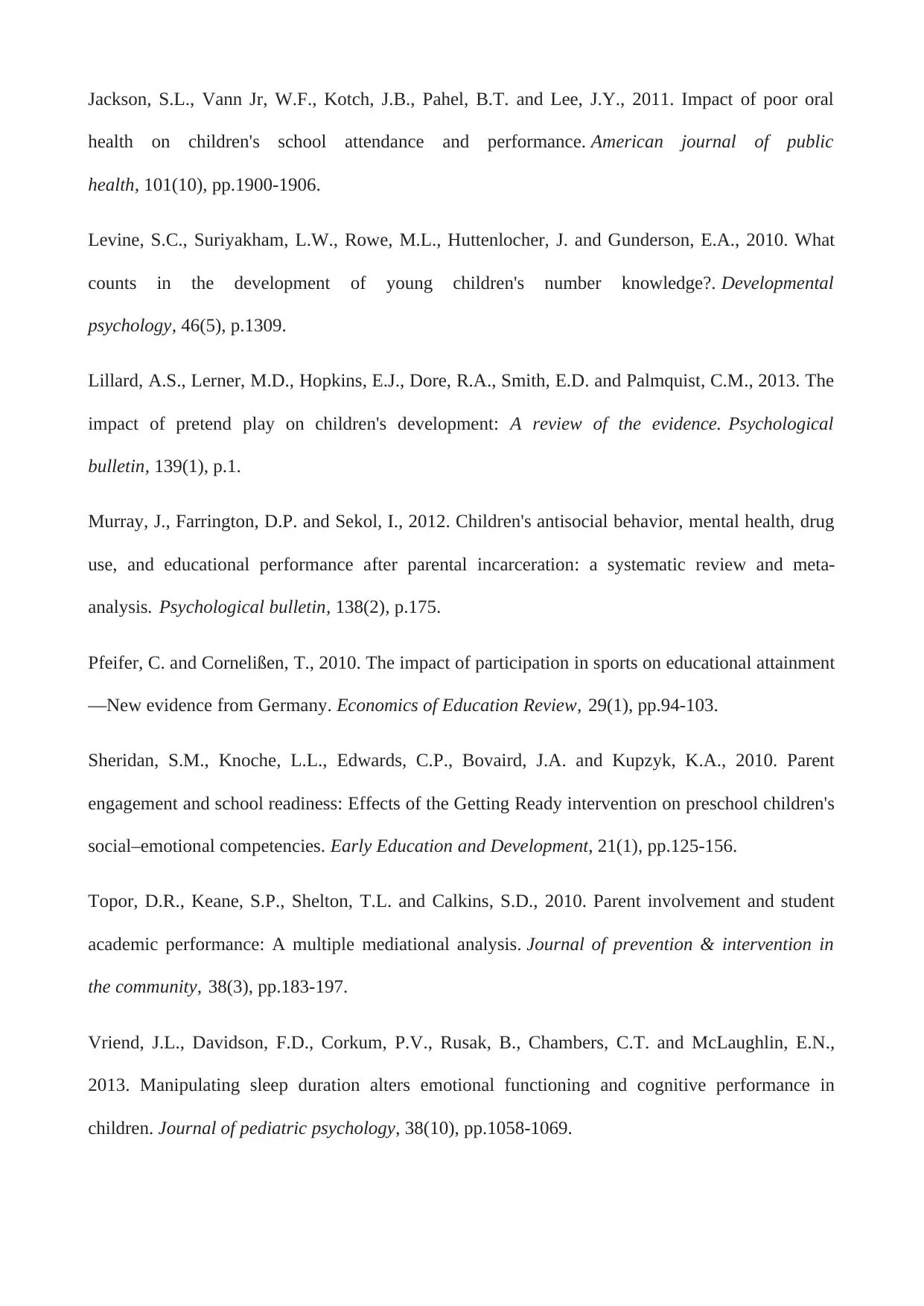
Jackson, S.L., Vann Jr, W.F., Kotch, J.B., Pahel, B.T. and Lee, J.Y., 2011. Impact of poor oral
health on children's school attendance and performance. American journal of public
health, 101(10), pp.1900-1906.
Levine, S.C., Suriyakham, L.W., Rowe, M.L., Huttenlocher, J. and Gunderson, E.A., 2010. What
counts in the development of young children's number knowledge?. Developmental
psychology, 46(5), p.1309.
Lillard, A.S., Lerner, M.D., Hopkins, E.J., Dore, R.A., Smith, E.D. and Palmquist, C.M., 2013. The
impact of pretend play on children's development: A review of the evidence. Psychological
bulletin, 139(1), p.1.
Murray, J., Farrington, D.P. and Sekol, I., 2012. Children's antisocial behavior, mental health, drug
use, and educational performance after parental incarceration: a systematic review and meta-
analysis. Psychological bulletin, 138(2), p.175.
Pfeifer, C. and Cornelißen, T., 2010. The impact of participation in sports on educational attainment
—New evidence from Germany. Economics of Education Review, 29(1), pp.94-103.
Sheridan, S.M., Knoche, L.L., Edwards, C.P., Bovaird, J.A. and Kupzyk, K.A., 2010. Parent
engagement and school readiness: Effects of the Getting Ready intervention on preschool children's
social–emotional competencies. Early Education and Development, 21(1), pp.125-156.
Topor, D.R., Keane, S.P., Shelton, T.L. and Calkins, S.D., 2010. Parent involvement and student
academic performance: A multiple mediational analysis. Journal of prevention & intervention in
the community, 38(3), pp.183-197.
Vriend, J.L., Davidson, F.D., Corkum, P.V., Rusak, B., Chambers, C.T. and McLaughlin, E.N.,
2013. Manipulating sleep duration alters emotional functioning and cognitive performance in
children. Journal of pediatric psychology, 38(10), pp.1058-1069.
health on children's school attendance and performance. American journal of public
health, 101(10), pp.1900-1906.
Levine, S.C., Suriyakham, L.W., Rowe, M.L., Huttenlocher, J. and Gunderson, E.A., 2010. What
counts in the development of young children's number knowledge?. Developmental
psychology, 46(5), p.1309.
Lillard, A.S., Lerner, M.D., Hopkins, E.J., Dore, R.A., Smith, E.D. and Palmquist, C.M., 2013. The
impact of pretend play on children's development: A review of the evidence. Psychological
bulletin, 139(1), p.1.
Murray, J., Farrington, D.P. and Sekol, I., 2012. Children's antisocial behavior, mental health, drug
use, and educational performance after parental incarceration: a systematic review and meta-
analysis. Psychological bulletin, 138(2), p.175.
Pfeifer, C. and Cornelißen, T., 2010. The impact of participation in sports on educational attainment
—New evidence from Germany. Economics of Education Review, 29(1), pp.94-103.
Sheridan, S.M., Knoche, L.L., Edwards, C.P., Bovaird, J.A. and Kupzyk, K.A., 2010. Parent
engagement and school readiness: Effects of the Getting Ready intervention on preschool children's
social–emotional competencies. Early Education and Development, 21(1), pp.125-156.
Topor, D.R., Keane, S.P., Shelton, T.L. and Calkins, S.D., 2010. Parent involvement and student
academic performance: A multiple mediational analysis. Journal of prevention & intervention in
the community, 38(3), pp.183-197.
Vriend, J.L., Davidson, F.D., Corkum, P.V., Rusak, B., Chambers, C.T. and McLaughlin, E.N.,
2013. Manipulating sleep duration alters emotional functioning and cognitive performance in
children. Journal of pediatric psychology, 38(10), pp.1058-1069.
1 out of 10
Related Documents
Your All-in-One AI-Powered Toolkit for Academic Success.
+13062052269
info@desklib.com
Available 24*7 on WhatsApp / Email
![[object Object]](/_next/static/media/star-bottom.7253800d.svg)
Unlock your academic potential
Copyright © 2020–2026 A2Z Services. All Rights Reserved. Developed and managed by ZUCOL.





